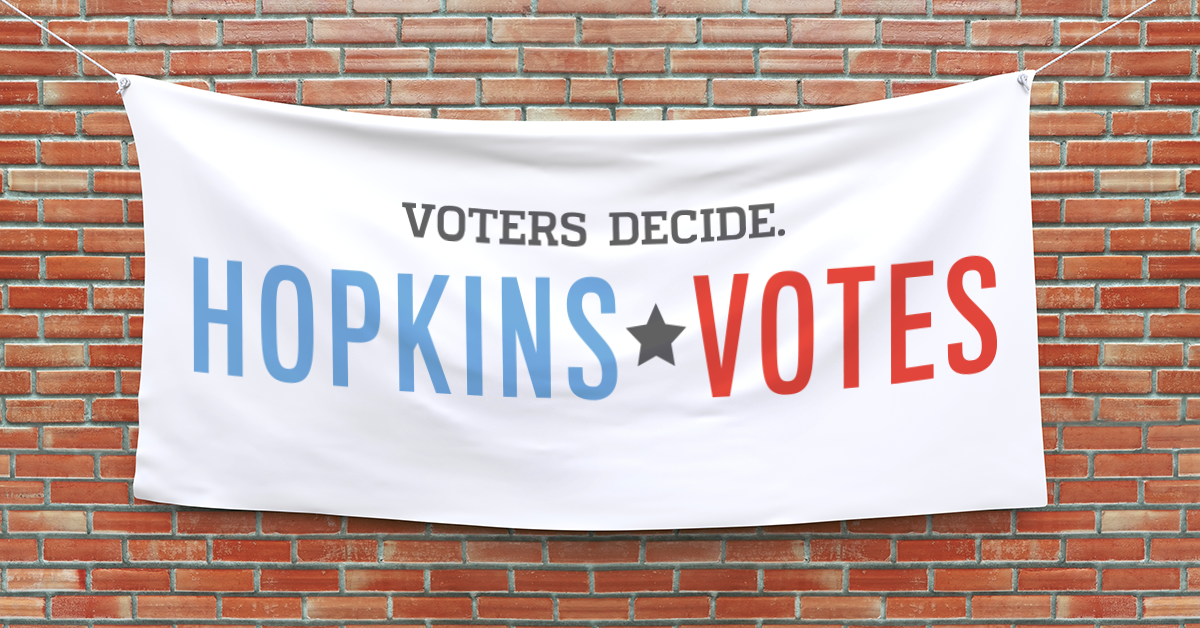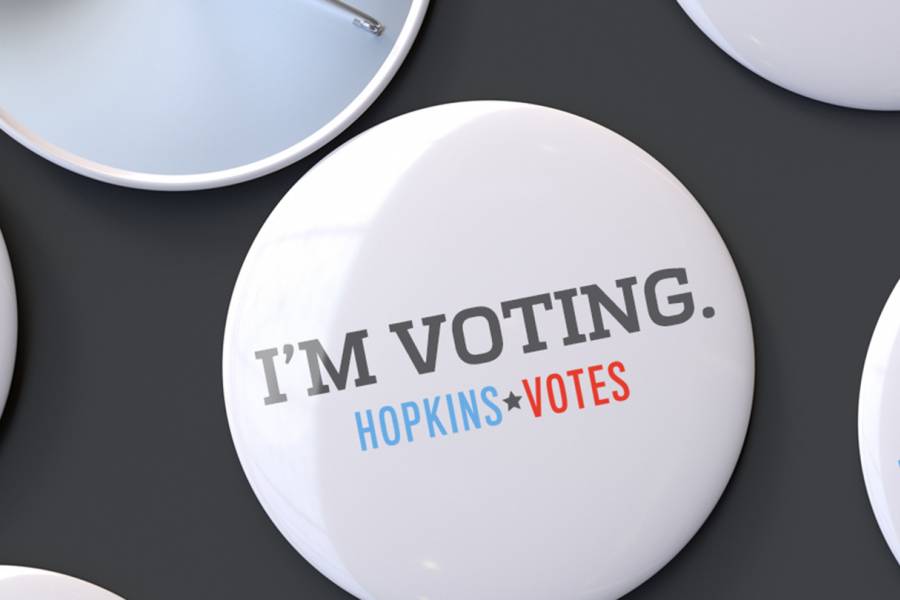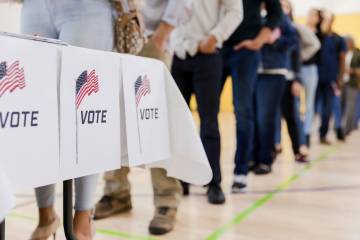In an election year marked by new norms across society and disruptions to the traditional methods of engaging in the democratic process amid the COVID-19 pandemic, it can be difficult for voters to keep up with information they need to participate in this year's election.
To make the process as simple and seamless as possible, the Johns Hopkins employees and volunteers behind the university's nonpartisan Hopkins Votes initiative have expanded their digital offerings—an effort to keep pace with the increased need for guidance in 2020, and also an adjustment at a time when the type of face-to-face interactions the group has leaned on in the past are not possible.
"We want to ensure that every member of the Johns Hopkins community makes a plan to vote, particularly our students who may be casting a ballot for the first time," says Whit Johnson, associate director at the Center for Social Concern. "It's one thing to be registered, but this year more than ever, we need people to start asking themselves how they are going to vote. Time is, at this point, of the essence."
This week marks Voter Registration Week at Johns Hopkins, with efforts ramping up across the institution to ensure that eligible voters are registered and prepared to participate in the upcoming election. Johnson encouraged all eligible voters to take a moment to finalize their voting plans and noted that Hopkins Votes also offers election information, guidance, and direct assistance to Hopkins faculty, staff, and students, as well as the wider community.
JHU also has a partnership with TurboVote, an online platform that delivers tailored election information—including registration forms, absentee ballot requests, information on how to determine your polling place, and deadline reminders—directly to participants' phones via text or email.
Johns Hopkins Medicine is encouraging participation in partnership with VotER, a nonpartisan, nonprofit organization focused on health care issues. VotER offers resources for employees, patients, and others who may still need to register to vote, need to request mail-in ballots, or want more information about the upcoming election.
For those who may require additional guidance, Hopkins Votes hosts virtual voter registration office hours from noon to 2 p.m. EST every Tuesday in September. There, Hopkins Votes student ambassadors will help guide individuals through the registration process, requesting an absentee ballot, or acquiring the ID required to vote in their state.
The Hopkins Votes team has asked every Hopkins student organization to commit to 100% voter registration for its eligible members, an effort to increase student participation in the election. To prepare organizational leaders, Hopkins Votes has created a toolkit with information, talking points, email templates, and posters encouraging others to register.

FAQ
Can I still register?
Each state varies in its requirements and deadline. National Voter Registration Day is Sept. 22, and you are encouraged to register as early as possible, and JHU affiliates can easily do so by visiting jhu.turbovote.org.
Where should I be registered?
You can register to vote in either your home state or where you are living to attend college, but you cannot be registered in both locations. Students who relocated to Baltimore for the fall semester can register in Baltimore or their home state, and request an absentee ballot. Students who are living out of state but attending Hopkins remotely cannot register in Maryland. Regardless of where you choose to register, you must ensure your registration information is up to date with your current address.
What is the difference between absentee voting and voting by mail?
Each state varies in its offerings for residents to cast a ballot. You are encouraged to visit your state's Board of Elections website to learn more about your ability to vote by mail, request an absentee ballot, or learn more about your polling location. Some states have started expanding absentee ballot eligibility (sometimes referred to as voting by mail) due to the COVID pandemic.
Is mail-in voting safe?
Yes, vote by mail is safe. Your ballot must be signed by you, which officials check compared to the signature they have on file. The USPS is secure, and many states offer the option to track your ballot to ensure it is cast. You are encouraged to request ballots at the earliest point allowable and return them as soon as you are able, at least one week prior to your state's deadline.
Can I vote online or by text?
No, you cannot vote online or via text in federal elections in the United States. The only ways to vote are by going directly to an official polling place or through mail-in ballot.
How can I verify that I am registered to vote?
To verify that you are registered to vote and that your voter record is correct, you can check your registration status or your state's election office well in advance of your state's voter registration deadline.
Who will be on the ballot?
Many states allow you to view your ballot in advance of casting your vote. This provides an opportunity to research all of the candidates on your ballot so that you can make informed decisions. Ballot Ready, Ballotpedia, and Vote411 are great sites to learn more about what is on your personal ballot outside of the presidential candidates prior to the election.
Posted in University News, Student Life, Politics+Society
Tagged hopkins votes









